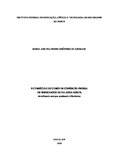O currículo do Curso de Comércio - PROEJA do IFRN Campus Natal-Zona Norte: identificando avanços, analisando dificuldades

Visualizar/
Data
2016-03-16Autor
Andrade, Maria Adilina Freire Jerônimo de
http://lattes.cnpq.br/1754953938247812
Metadado
Mostrar registro completoResumo
The object of study of the present work is the curriculum of the course of Trade, PROEJA1 system, held in Natal Zona Norte campus. It is intended to do so by investigating the prescribed and concluded curriculum to this education model in an attempt to unveil, whether the way PROEJA was formed and has been implemented meets the demands and particularities of the students who are beneficiary of this program, which are young adults and adults. Following the curriculum critical approach, the theoretical-epistemological cornerstone is supported mainly in the theoretical contributions of Apple (2006), Giroux (1997), Silva (2002), Moreira e Silva(2006), Sacristán (2000), Pacheco (2001), Ciavatta (2005), Ramos (2005,2008), Fazenda (1997, 1991), Santomé (1998), VeigaNeto (1997), Frigotto(2005), Manacorda (2007), Gramsci (2000) and Saviani (2003). Getting support in the procedures and instruments of qualitative research, two data collection techniques were developed: the carrying out of interviews with teachers and focal group sessions with students having as an analysis methodology the triangulation. Disseminated by the interface of the researched context, the results showed up that the curriculum of Trade, PROEJA system, as it is set up today, has been meeting partly the needs of its public because it still needs some adjustments and actions in order to be more effective. Itwas found out on the integration between Basic and Professional Education proposed in the course pedagogical project that it has not become effective in the everyday classroom practice. In addition, the integrative pedagogical practices are not current realities, but scattered activities carried out in field trips, integrative project and other events, which gather more than one school subject. It can be inferred from the researched people that the change of curriculum in 2012, in which school subjects of different nuclei are spread since first semester, makes the integration between the General and Professional Education subjects possible, as well as it advocated the holding of integrative pedagogic processes, even though, it has not occurred in a real context. By the analysis of the teachers’ reports, it happens because of the lack of conversation among teachers, as well as the disciplinary formation they have had which did not establish a connection among the different areas of knowledge.



